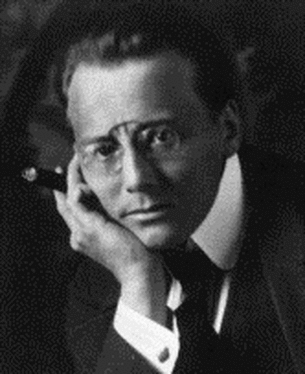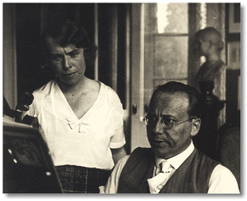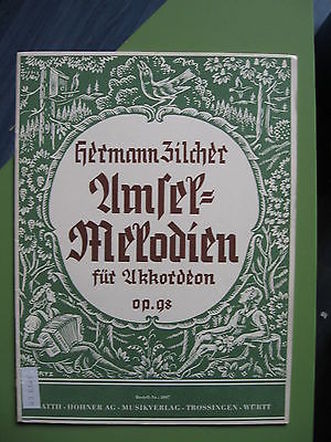Zilcher Hermann ( 1881 - 1948 )

Hermann Zilcher was born in Frankfurt am Main on August 18th 1881. His father was Paul Zilcher, a famous piano teacher. Since he was five years old, his father taught him to play on the piano and at the age of 16 Hermann Zilcher went to the Hoch Conservatory in Frankfurt where he studied with Iwan Knorr and James Kwast. At the conservatory he was stylistically influenced by Bernhard Scholz, a teacher of composition and a friend of Johannes Brahms.
After graduation, the scolarship the Mozart Prize for the support and education of musical talent in composition allowed him to stay in as an artist in Berlin from 1901 till 1905. Here he quickly was known as a composer and accompanist.
From 1905 till 1908 Hermann Zilcher was a teacher at the Hoch Conservatory in Frankfurt. In 1908 he was appointed at the Academy of Music in Munich, where he was a professor for piano from 1912 till 1920. Since 1919 he was also professor of composition.
In Munich he had successes with incidental music, in collaboration with O. Falkenberg, with the "Deutchen Folkliedernspiel", Op. 32 (1915), and the C sharp minor Piano Quintet, Op. 42 (1919)
In 1920 Zilcher became director of the State Conservatory in Würzburg. It was during his 25 years of activity here in Würzburg that he would celebrate his greatest successes.
After graduation, the scolarship the Mozart Prize for the support and education of musical talent in composition allowed him to stay in as an artist in Berlin from 1901 till 1905. Here he quickly was known as a composer and accompanist.
From 1905 till 1908 Hermann Zilcher was a teacher at the Hoch Conservatory in Frankfurt. In 1908 he was appointed at the Academy of Music in Munich, where he was a professor for piano from 1912 till 1920. Since 1919 he was also professor of composition.
In Munich he had successes with incidental music, in collaboration with O. Falkenberg, with the "Deutchen Folkliedernspiel", Op. 32 (1915), and the C sharp minor Piano Quintet, Op. 42 (1919)
In 1920 Zilcher became director of the State Conservatory in Würzburg. It was during his 25 years of activity here in Würzburg that he would celebrate his greatest successes.
Zilcher reorganized the State Conservatory, established new training courses and led the institute to a new quality level. As a composer, pianist and conductor he had widespread reputation in the German speaking countries.

On his 60th birthday, in 1941, Zilcher was awarded with the "Goethe Medal of Art and Science", "The City Silver Plaque " of the city Würzburg and the "Golden Mozart Medal" of the Mozart Foundation in Salzburg.
In 1936 Zilcher had also started composing for the accordeon. During WWII the nazis claimed that the accordeon was a nigger instrument and tried to stop the use of accordeon for performing classical music. This caused that the growth of the accordeon slowed down in Germany (Thanks to the Hohner Company the accordeon was never banned). But this didn't prevent Zilcher from composing his major works for accordeon during this hard period.
In 1936 Zilcher had also started composing for the accordeon. During WWII the nazis claimed that the accordeon was a nigger instrument and tried to stop the use of accordeon for performing classical music. This caused that the growth of the accordeon slowed down in Germany (Thanks to the Hohner Company the accordeon was never banned). But this didn't prevent Zilcher from composing his major works for accordeon during this hard period.
In the years after WWII Zilcher completed two other major works, but not for accordeon: the symphonic cantate "Du aber, Here bist unser Vater, Op. 111" and "der 5. Symphonie, Op. 112"
Hermann Zilcher died on new years eve, January 1st 1948. After his death followed a period of silence and near-oblivion of the composer and his music. Today we live in a time that has developed again sensitivity to the subtle nuances of the late Romantic Music. In this spirit Zilcher's sound sensitive and vital music deserves to be heard and performed again.
Hermann Zilcher died on new years eve, January 1st 1948. After his death followed a period of silence and near-oblivion of the composer and his music. Today we live in a time that has developed again sensitivity to the subtle nuances of the late Romantic Music. In this spirit Zilcher's sound sensitive and vital music deserves to be heard and performed again.
|
Works for accordeon
1936: three pieces for accordeon, Op. 82
1938: Aus meiner Ferien Mappe, 5 pieces for accordeon, Op. 88b
1940: Die schöne Tanzerin 1940: Einmarz der Exoten 1940: Variationen über ein fränkisches Volkslied 1941: Variationen über ein Thema von Mozart (duet for accordeon and violin) 1942: 6 Amselmelodien, Op. 98 1943: Variationen über ein Tanzliedchen aus der W¨rzburger Gegend, Op. 97 (duet for accordeon and violin) 1944: Variationen Ûber ein Thema aus dem Steichquartett, op. 29 von Franz Schubert, Op. 99 (duett for accordeon and violin) 1946: 5 Duette für zwei Akkordeons, Op. 106 1947: Aus meinen Skizzenbuch |
Sources:
http://www.oehmsclassics.de/cd.php?formatid=301 http://www.accordion-online.de/composer/e_hz.htm http://www.ksanti.net/free-reed/history/classic2.html http://artmusic.smfforfree.com/index.php?topic=606.0 http://en.wikipedia.org/wiki/Hermann_Zilcher |

